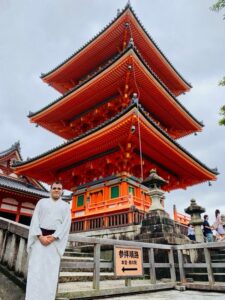A Dialogue with an Indian Entrepreneur Thriving in Japan for 22 Years
This article is especially for: 🇮🇳 Indians considering working in Japan
・What’s it really like to work and live in Japan?
・Is the language barrier really that difficult?
・Will I be accepted as an India in Japan?
From Admiration to Reality
Jishnu san’s attraction to Japan began early in life. He was deeply fascinated by Japan’s technological prowess, post-war recovery strength, and unique cultural concepts like “samurai, kaizen, and ikigai.” While most Indians at the time were looking toward America or Europe, he was different. “I guess I was a bit different. I had been looking at Japan since I was young,” he reflects.
Twenty-two years ago, his dream of coming to Japan finally became reality. Today, he operates as an entrepreneur in both the IT industry and automotive parts manufacturing, serving as a bridge between Indian and Japanese businesses across multiple ventures. Shaping the India-Japan Business landscape with various roles
Battling the Language Barrier: Starting from Zero

Did you study Japanese before coming to Japan?

Not at all Just “Ohayo”, “Sayonara”,”Konnichiwa” and “Konnbanwa”– those four words! That’s all!

WOW, starting life in Japan must have been incredibly difficult….

It really was. Especially in the early 2000s, there were no translation apps. And many Japanese either didn’t speak English or felt embarrassed about speaking English with foreigners.
He says he has such an unforgettable memory.
“During my first month in Tokyo, I was lost looking for a client’s office. A middle-aged woman noticed my distress and not only gave me directions but walked with me all the way there. It was truly heartwarming.”
This experience shaped his impression of Japan. Even when words don’t connect, human kindness transcends language barriers – a lesson he learned firsthand.
Workplace Environment: Expectations vs. Reality
Before coming to Japan, Jishnu san had expectations of “organized and efficient workplace culture, long working hours, emphasis on seniority and hierarchy, advanced technology and discipline, and strong community spirit.”
When he actually started working, he was indeed surprised by the importance of punctuality, strict dress codes, and clear hierarchical structures. The culture that prioritized group harmony over individual expression was also very different from India.However, what impressed him even more was his colleagues’ thoughtfulness. “Colleagues are very kind and supportive in every detail. They explain situations thoroughly, processes are strictly followed. You’re respected at every level and receive feedback in all areas.”
Discovering Japan: Exploring 30 Out of 47 Prefectures
Jishnu san’s love for Japan is evident in how he spends his free time. He has visited 30 out of Japan’s 47 prefectures, enjoying hot spring tours, golf, stadium sports viewing, and above all, culinary exploration.
“Japan isn’t just Tokyo and Osaka. There are beautiful places in Shiga, many castles, greenery, mountains, lakes. There are coastlines too, and visiting rice fields in rural areas is truly wonderful. Japan goes far beyond Tokyo.”
He emphasizes the importance of traveling throughout the country for a true understanding of Japan. “I recommend making friends, attending events, and participating in community activities. If you have the will to live here long-term rather than thinking short-term, I think you can adapt easily.”


Adapting as a Vegetarian
As a vegetarian who came to Japan, Jishnu san initially faced dining challenges.When ordering a vegetarian pasta, with the probability that it would come with ham, (lol) but insisting on vegetarian would cause confusion about cheese, milk etc. However, he says, “There are a lot of vegetarian food options like Japanese soba, veg tempura, tofu, natto, okonomiyaki & vegan ramen, a lot of rice based dishes like onigiri, miso soup, etc. the choices aren’t that extensive, but you can manage. Now there are many Indian restaurants in Tokyo & Japan as well as Thai, Sri Lankan, Mexican restaurants who serve vegetarian dishes. A lot of Italian places offer vegetarian pizza and pasta.”
The improvement in delivery services has also been a significant change.
“It’s actually simple. It’s a matter of mindset,” he asserts.
Realistic Approach to Living Costs in Japan
Regarding living costs that many people worry about, Jishnu san offers practical advice.
“There’s no magic solution for living costs. Live in places a bit further from Tokyo, like Chiba or Saitama, and commute 45-50 minutes to an hour to work.”While living costs are indeed high, there’s low inflation, risk-free, clean, and everything is perfectly organized. The Tokyo train system is legendary, it is a living city that never slows down. Think of it as paying a slightly higher price for that.”
Cultural Bridges: India’s Spiritual Legacy in Japan
Beyond business success stories Jishnu san says there exists a profound cultural connection between India and Japan that spans centuries.
Several Indian deities have been integrated into Japanese religious practices – Saraswati (Benzaiten), Ganesha (Kangiten), Shiva (Daikokuten), and Lakshmi (Kichijoten) – creating a spiritual bridge between the two nations.Indian yoga has also gained significant popularity across Japan, with studios now found throughout the country.


The India-Japan cultural connection has been beautifully encapsulated in a powerful new diplomatic initiative started by the Indian Prime Minister Modi san & the late Shinzo Abe San. H.E. Shri Sibi George, India’s Ambassador to Japan, introduced the inspiring slogan: “CONNECTING HIMALAYAS WITH MOUNT FUJI.” This statement represents more than diplomatic rhetoric – it symbolizes the spiritual, cultural, and now increasing economic bonds between these two great nations.
The slogan speaks to the shared reverence both cultures hold for their sacred mountains, the similar spiritual quests that drive both societies, and the natural partnership that emerges when ancient wisdom meets modern innovation. For entrepreneurs like me, this cultural foundation provides not just business opportunities, but a spiritual home away from home.
Working in Japan: Process and Patience
Core Advice for Those Who Want to Work in Japan

Finally, please give advice to those who want to work in Japan.

Simple advice. If you want to work in Japan, prioritize Japanese language skills, respect Japanese culture, etiquettes and work ethics, follow the process, be patient, and think for the long-term. There are a lot of benefits like social security, special allowances for children etc.And a lot of direct flights from Japan with prominent Indian cities.

Specifically, about the Japanese language learning ?

If you want to be here long-term, Japanese language skills are extremely important. Make it a priority. Make Japanese friends, attend classes in the early stages itself, and learn as much as possible. At least to conversational level. This will help tremendously and will better your life.
Summary
arriers, cultural differences, and climate adaptation. However, by understanding the “culture,” practicing “patience,” and above all, maintaining a “long-term perspective,” he was able to overcome these challenges. For those considering working in Japan, his experiences serve as a valuable guide. The most important takeaway: commitment to learning Japanese, respect for Japanese culture and work ethics, and maintaining a long-term perspective. His words, “This country made me a better person,” contains 22 years of gratitude and affection. Jishnu san’s positive mindset and proactive approach represents an admirable attitude worth emulating. As a Japanese person, meeting someone who loves Japan this much was truly heartwarming.
Interviewed by Keisuke Nakamoto


コメント